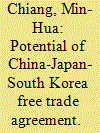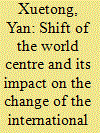| Srl | Item |
| 1 |
ID:
124178


|
|
|
|
|
| Publication |
2013.
|
| Summary/Abstract |
Despite numerous channels for communication and abundant supply of information, misperceptions occur in international politics, and the recent interaction between Japan and China over a group of disputed islands is a case in point. Their quarrel has intensified, leading to a sudden deterioration of civil and official ties, with effects felt in the political and economic realms, and repercussions on the overall relationship. Although some would argue that both sides do not have a better choice, their interaction reveals certain misperceptions and therefore other possibilities. This article surveys the actual conditions after Japan's decision to nationalize the disputed islands in 2012, illustrates misperceptions on both sides in their interaction based on those findings, and probes into the possible causes of such misperceptions.
|
|
|
|
|
|
|
|
|
|
|
|
|
|
|
|
| 2 |
ID:
124180


|
|
|
|
|
| Publication |
2013.
|
| Summary/Abstract |
This article explores the economic calculations behind the recent initiatives for the Free Trade Agreement (FTA) between the Governments of China, Japan and South Korea (CJK) and clarifies the implications for future regional economic integration. First, the proposed trilateral FTA signifies an advancement of China-centered regional economic integration. Regional economic integration led by China may also increase its political clout at the global stage. Second, the Governments of South Korea and Japan seek greater involvement in China's huge domestic market, but the former is concerned that a trilateral FTA will worsen its trade deficit with Japan, and the latter is afraid of losing its market shares in China and America to its Korean rival. Japan, therefore, seeks membership of both the CJK FTA and the Trans-Pacific Partnership (TPP). Third, China and the US' active involvement in regional economic integration will push the three countries to go forward towards greater economic cooperation. However, it will take longer for China-led Regional Comprehensive Economic Partnership (RCEP) and America-led TPP to bear fruit because of the large number of countries involved. Therefore, the conclusion of CJK FTA will be an important boost for the further progress of both RCEP and TPP. It will also be an important stabiliser for the trilateral political relations in the future.
|
|
|
|
|
|
|
|
|
|
|
|
|
|
|
|
| 3 |
ID:
124182


|
|
|
|
|
| Publication |
2013.
|
| Summary/Abstract |
The shift of power engendered by the rise of China will not only change the current international configuration, but will likely lead to a shift of the power centre of the world from Europe to East Asia. Nevertheless, neither the change of the international configuration nor this transfer of the power centre of the world will inevitably bring about the change of the international system. The international system consists of three components including international actors, international configuration and international norms. If a qualitative change of one of these components were treated as a qualitative change of the system, it would not be possible to distinguish the difference between the components and the system nor to determine the relationship between them. A minimum of a qualitative change of at least two components must be observed to be defined as a qualitative change in the system. Because the rise of China is the main engine changing the international configuration, it will be faced with increasing pressure from the system. Thus, China has to adopt a foreign strategy in accordance with its international status and policy for wining more strategic partners and constructing new international norms.
|
|
|
|
|
|
|
|
|
|
|
|
|
|
|
|